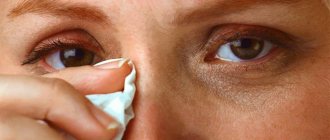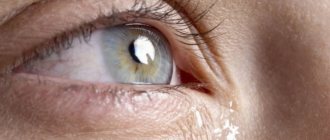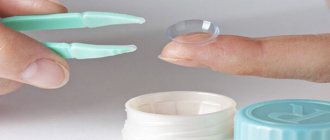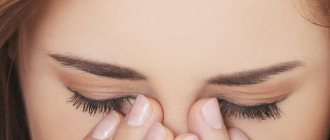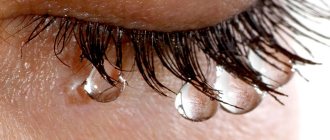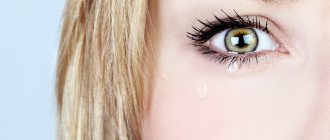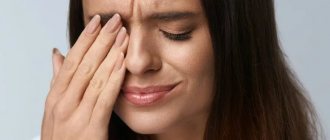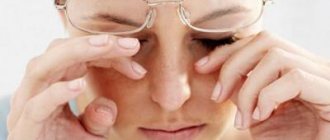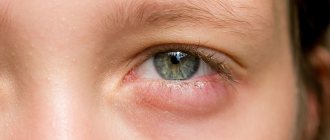Author Peter Deryabin
11/20/2003 08:04 (Updated: 01/19/2021 23:48)
Health » Vision » Prevention
“My eyes water a lot in frosty weather. The doctor said it was natural. Is he right? A. Gorina, Lviv
Treatment of lacrimation
An ophthalmologist at the Moscow State Institution MNTK “Eye Microsurgery” named after S. N. Fedorov, Angelina Ivanovna LYSENKO, answers the reader’s question .
What are tears for and what is lacrimation?
Some associate this phenomenon only with the emotional sphere and believe that tears are released from the eyes at moments of strong emotions (grief, pain, joy and laughter).
But they perform several tasks at once, which many are not aware of. Tear fluid is produced by a special gland located in the upper part of the eye socket. Human tears contain salts, proteins and lysozyme. Thanks to this structure, they are a fairly effective antiseptic with which the human body fights bacteria and microbes that attack the visual organs in everyday life. With normal functioning of the gland and lacrimal apparatus, the liquid envelops the surface of the eyeball, cleansing the conjunctiva and removing debris. Thus, drying out of the eyes is prevented, they are protected from all kinds of irritants (dust, bacteria, etc.), while the cornea is nourished at the same time.
In general, tears perform very important functions for the visual system:
- Create a thin film on the surface, protecting them from microtrauma and bacteria.
- Cleanses the eyes from dust, debris and other irritants, ensuring good condition and functioning of the visual system
- Removes toxins that have a negative effect from the human body
- Psychotropic natural substances contained in tears help a person to calm down, reduce the level of tension and anxiety in stressful situations
Typically, about 1 ml of tears are produced per day, which is enough to effectively nourish and protect the visual organs. Sometimes the process of tear production is disrupted, and the amount of fluid is much higher than normal. In such a situation, tears may flow constantly, outdoors, in inclement weather or during strong winds.
Any adult who feels discomfort from excessive tearing is trying to find out what to do at such a moment and what effective treatment should be. Among the common causes, ophthalmologists name:
- Bacterial and viral infections that cause diseases of the visual system
- Fungi, eye lesions with demodicosis
- Seasonal, food and other types of allergies
- Irritation caused by chemicals, ultraviolet radiation or mechanical stress
- ARVI and influenza
- Pathologies of the nasopharynx, lacrimal sac and ducts
- Wrong glasses and corrective lenses
Allergy and its symptoms: eyes are swollen, painful
Often, tearfulness increases when going out into the sun, when there is no direct view of the heavenly body, and discomfort is present in full. Usually in such cases, doctors consider allergies as the cause of this condition. It is also characterized by other symptoms:
- Puffiness of the eyelids - the eyes become swollen, the upper eyelids hang over the eyeballs. This condition may manifest itself too intensely and in this case, instead of the usual size of the eyes, only a narrow gap remains.
- Redness of the eyeball and lower/upper eyelid. It can be local - for example, affecting only the edges of the eyelids or exclusively the eyeball. But most often, hyperemia due to sun allergies is diffuse and pronounced red circles with a dark tint form around the eyes.
- Pain, feeling of pressure from inside. This symptom appears only in the absence of treatment and too much exposure to sunlight. First, the eyes begin to hurt when you touch them, then the same sensations are present “at rest.” Due to pressure from within, patients complain of a sudden headache that is not relieved by conventional painkillers.
- The itching is obsessive and cannot be relieved even with local medications (ointments). The eyes begin to itch from the eyelids, then the person experiences a sensation of itching directly in the mucous membrane of the eyeball.
All symptoms of sun allergy are interconnected - excessive lacrimation provokes irritation and itching, scratching the eyes aggravates the primary problem, the skin of the eyelids begins to swell and redden.
Categories
AllergistAnesthesiologist-resuscitatorVenereologistGastroenterologistHematologistGeneticGynecologistHomeopathDermatologistPediatric gynecologistPediatric neurologistPediatric urologistPediatric surgeonPediatric endocrinologistNutrologistImmunologistInfectious disease specialistCardiologistCosmetologistSpeech therapistElorologistMammologistMedical lawyerNarcologistNeurologistNeurosurgeon NephrologistNutriciologistOncologistOncourologistOrthopedist-traumatologistOphthalmologistPediatricianPlastic surgeonProctologistPsychiatristPsychologistPulmonologistRheumatologistRadiologistSexologist-AndrologistDentistTherapistUrologistPharmacistPhytotherapistPhlebologistSurgeonEndocrinologist
Why do an adult’s eyes water, what to do?
Mostly, such sensations occur outside in cool weather. Eyes often water in the wind, and there are also many cases where eyes water from light. A problem that often arises is when your eyes water in the cold. Why is this happening? Before moving on to self-treatment, you need to exclude medical treatment, and for this you need to know the cause of this problem.
Causes of watery eyes:
- changes in light, wind direction and temperature;
- severe visual strain in bright sunlight or gusty winds;
- allergic reaction;
- increased load on the organ of vision;
- uncomfortable glasses or lenses;
- entry of a foreign body;
- deviations in the condition of the blood vessels and muscles of the eye (in older people);
- eye injuries;
- infectious eye diseases;
- heredity factor;
- fungal infections;
- overwork;
- hypovitaminosis;
- conjunctivitis, rhinitis;
- dry eye syndrome;
- obstruction of the nasolacrimal duct.
Based on the causes of the problem, the following symptoms may be observed:
- pain syndrome;
- pain and burning sensation;
- purulent discharge;
- change in the color of proteins (often redness);
- fear of light.
Such changes mainly occur in adults, since they are most susceptible to the influence of various weather conditions and external irritants.
What to do
If tearing is not a rare occurrence, vision deteriorates and other unpleasant symptoms are observed, you should consult an ophthalmologist. In combination with drug treatment, you can treat your eyes with exercises at home.
And if medical intervention is excluded and the problem is not very serious, then it is worth resorting to the help of folk remedies, which you can prepare and use yourself, and the resulting effect will be more effective and mild than from the use of medications.
Causes
The main causes of hypersecretion:
- Allergy;
- Conjunctivitis, keratitis;
- Chemical, mechanical or light irritation of the conjunctiva or cornea;
- Colds.
Read how to treat conjunctivitis in an adult here.
To eliminate hypersecretory lacrimation, it is necessary to begin treatment of the disease that caused this symptom as early as possible.
Possible causes of retention:
- Dacryocystitis (inflammation of the lacrimal sac);
- Narrowing or obstruction of the tear duct;
- Pathologies of the nasal mucosa (polyps, sinusitis, swelling of the nasal mucosa, rhinitis);
- Eversion of the century.
It's not just allergy sufferers who experience watery eyes. People with increased sensitivity of the body often experience similar discomfort on the street. Perfectly healthy people also suffer from lacrimation. In winter, this may be due to frost and strong north winds; in spring - the flowering of certain plants, in summer - bright sun, dust, pollen, and in autumn - vitamin deficiency, unfavorable weather conditions.
Additional factors for lacrimation:
- Tendency to allergies;
- Bruises and eye injuries;
- Incorrectly selected glasses;
- Hereditary factor;
- Fungal infections (demodex of the eyelids and others).
How to treat demodicosis of the eyelids, see the link.
When the eyes water on the street, a narrowing of the eye tract occurs in the body, as a result of which the outflow of tears into the nasopharynx with further removal through the eyelids is disrupted. If this condition recurs, it is recommended to immediately consult an ophthalmologist, who, after a detailed diagnosis, will determine the main reason why the eye is watering. It is possible that the pathology is congenital, and getting rid of it will be much more difficult than curing an acquired eye disease.
What to do: troubleshooting and preventive measures
What to do to get rid of an unpleasant symptom? Depending on the causes of lacrimation in the cold, appropriate treatment is selected, which is considered necessary if lacrimation does not stop for a long time after a person enters a warm room from the cold.
Dry eye syndrome
If dry eye syndrome is diagnosed, moisturizers and keratoprotective drops (Vidisic, Visin, Lacrisin, Oftagel) are prescribed.
Conjunctivitis
For cold conjunctivitis, complex treatment is used, when in addition to antihistamines (azelastine, ketotifen, opatanol), vasoconstrictor drops (okumethyl, octylia) and anti-inflammatory drugs are additionally used.
Increased eye sensitivity to low temperatures
But often specific drug treatment is not required: if the eyes are hypersensitive to low temperatures and ultraviolet radiation, it is enough to use sunglasses.
Since an allergy to cold is often not a pathology that specifically affects the eyes, but covers the entire face and subsequently spreads to the conjunctiva, care should be taken to ensure that the facial skin is well protected.
Need to know! To do this, it is better to wrap your face up to eye level with a scarf in severe frost, and before going outside, your skin can be lubricated with any fatty cosmetic cream.
Traditional medicine
If symptoms are severe, you can use traditional medicine to help stop lacrimation or ease the symptom. Such means include:
- Any liquid type of honey is diluted with water in a ratio of 1 to 3 and stirred thoroughly. In the first ten days, the product is instilled twice a day, two drops into each eye, then a new portion is prepared at a concentration of honey and water in a ratio of 1 to 2. Instillation occurs over the same 10 days in the same quantities. Then you need to reduce the concentration again by diluting the components in the same ratio and also complete a ten-day course of instillation. To prepare the product, you must use only distilled water. For some people, this product may cause a short-term tingling sensation in the eyes after instillation. And if such sensations do not go away for a long time and are quite painful, it is better to abandon the remedy.
- A tablespoon of dried cornflower flowers is poured with half a glass of vegetable oil and left for 1-2 hours. Cotton pads are soaked in the product and placed on the eyes once a day for 20 minutes.
- A teaspoon of cornflower flowers is mixed with the same amount of caraway seeds and poured with a glass of boiling water. After cooling, the product is filtered and can be used either a couple of hours before going outside, or at regular intervals three times a day.
- You need to sew two bags the size of tea bags from any natural fabric and pour one tablespoon of dried dill seeds into them. The bags are placed in a glass or other convenient container and poured with boiling water so that the water completely covers the bags. After 15-20 minutes, when the seeds have steamed well, the bags are taken out of the water, allowed to cool to an acceptable temperature and applied to the eyes for 10-15 minutes. The procedure is performed twice a day.
Attention! Preventive measures for lacrimation in the cold primarily include normalizing the diet, which should include foods high in potassium and vitamins A, B and C.
Recommended foods include carrots, blueberries, seafood, eggs, liver, bell peppers, nuts, rose hips, raspberries, cabbage and any citrus fruit.
Sunglasses
If your eyes are sensitive to cold in winter, you should wear sunglasses.
And if there is no acute reaction to sunlight, the glasses may not be too dark.
Any ophthalmological diseases that arise in the autumn-winter period must be treated in a timely manner, since with such pathologies lacrimation always increases.
Useful video
Watch the video about eye diseases from the sun:
Similar articles
- Sunburns of the eyes: causes, symptoms, treatment...
Sunburns of the eyes occur not only due to direct gaze at the luminary. For example, you can get them in the mountains, when looking at the snow. Symptoms are sharp pain in the eyes, inability to see daylight. Treatment of a retinal burn is carried out by a doctor; you can only relieve the symptoms on your own. Read more - Chills after the sun: why and what to do after sunbathing
If you feel chilly after the sun, then this is a sure sign of a burn. If there are no more severe symptoms - vomiting, high fever, then you can make compresses from traditional medicine or use medications. If you have them after sunbathing, you should consult a doctor. Read more
- Burnt nose: first aid, what to do if...
Quite often, both at sea and just when walking along the streets, it happens that your nose gets burned. In this case, first aid is the use of ointments for sunburn. You can also make compresses, and if your nose is peeling, then gentle peelings. Read more
- How long does redness last after sunbathing?
How long redness lasts after sunbathing is influenced by two factors - individual reaction and the degree of burn. For example, with mild redness it will be possible to get rid of it in 2 days, with severe hyperemia it will take up to 10 days. What can I do to speed up healing time? Read more
- Solcoseryl for burns: is it possible to smear, what is better...
Is it possible to use Solcoseryl for burns? Which form is better to choose - ointment, gel. Rules for using Solcoseryl for sunburn on the face and body. Read more
Eyes watering on the street, what to put in drops
Severe tearfulness of the glands is an unpleasant symptom that every person has experienced at least once in their life. However, if it appears systematically, then it is worth thinking about what is behind this phenomenon. Often the eyes react to cool weather, but they water for a few minutes. If the period is more significant, but it is not a matter of weather phenomena. Before choosing drops, it is worth understanding what you have to fight with. It is imperative to find the reason here.
Why do my eyes water on the street?
Even if you visit an ophthalmologist, the specialist will try to find the root cause so that the treatment is as effective as possible. The human eyes are an extremely sensitive organ that can react to literally everything outdoors - from bright light to frost in winter. The main factors why eyes become watery include the following:
- Protective reaction of the body. Even a gust of wind outside irritates the mucous membrane, and the liquid is a natural lubricant. If you remove harmful influences, such as dust or wind, then the tears stop.
- Eye strain. If you start to cry on the street when you try to look at the road or signs, there is nothing serious about it. This also includes too bright sunlight.
- Overwork. Occurs when the eyes are constantly tense. Typically for drivers and people who look at the screen for a long time.
- Wrong glasses. Eyes on the street cannot quickly adjust their vision due to incorrect diopters.
- Wearing lenses. In this case, the glands water even indoors if the selected models turn out to be uncomfortable and unsuitable in size.
- Foreign body under the eyelid.
- Cosmetics with expired expiration dates or too aggressive components.
- Allergic reaction. If your eyes water only on the street, then the irritant can only be there.
- Lack of vitamins.
- Conjunctivitis.
Often the cause is also an illness, for example, ARVI or influenza. But in this case, not only do the eyes water, but the temperature also rises and a runny nose or cough appears. Often, with a cold, problems with the visual organs are especially relevant in children; in adults they are not so sensitive.
Treating tearfulness on the street
Despite the temporary inconvenience that tears bring, you may feel discomfort. At the same time, any person will not like it when the symptom is repeated again and again. We often hear complaints: “I just go outside and my eyes immediately water!” Treatment is not required only if it is a reaction to weather conditions or irritants in the form of wind and dust. One piece of advice here is to wear glasses without prescriptions. Sunglasses help protect against the sun. In other cases, follow these tips:
if you have dry eye syndrome, which also manifests itself outdoors, then you need to restore the natural mucous tear. Special drops help with this. These include Visin, Lacrisin, Hypromellose and the like
If such a syndrome causes an ulcer, then surgical intervention is necessary; if your eyes are watery due to glasses or lenses, you need to urgently change them by contacting a specialist; if the organs of vision become watery due to a foreign body, then it is important to rinse the eyes with boiled water as quickly as possible; against allergies, three types of drops are used - antihistamine (Opantol), anti-inflammatory (Acular) and vasoconstrictor (Vizin); If you feel a lack of vitamins and your eyes constantly water outside and indoors, eat food rich in B12, A, C, D. Pay special attention to carrots, blueberries, black currants, and nuts. They are necessary for problems with the organs of vision; if the cause of tearing lies in an aggressive cosmetic product, you will have to abandon it; if you become the owner of bacterial conjunctivitis, then Visin, Vitabac drops, Torbex and Okatsin ointments will help. If the disease is viral, then Lokferon drops are needed; if the reason is old age and failure of the glands, then you need drops that belong to the group of “artificial tears”
Prevention of lacrimation in the cold in children
Keep in mind! In addition to recommendations for protecting the eyes with glasses while outdoors, children are advised to strengthen their eyes with the help of special ophthalmological gymnastics.
This will help activate the protective mechanisms of the eyes and eliminate the negative reaction of the visual organs to cold.
Also, as an additional remedy, you can use drops from the category “artificial tears ,” which can be purchased without a prescription and used from the first years of life.
If a child wears glasses or contact lenses, you need to make sure that the optics are correctly selected .
Wearing glasses and lenses with “wrong” diopters leads to additional stress and fatigue of the eyes, resulting in increased tear production.
Causes of excess tear fluid
The causes of lacrimation can be related directly to eye pathology or to diseases of other organ systems, as well as external causes.
Ophthalmological “prerequisites” for increased tear production
- Dry eye syndrome when working at a computer for long hours. Many people mistakenly think: if your eyes are very watery, what kind of dryness can we talk about? This condition is associated with failures in the renewal of the tear film on the cornea, namely due to fixation of the gaze at one point or the rapid flickering of “pictures” on the screen.
- Overwork. Drivers, dispatchers, accountants - these professions are associated not only with increased concentration, but also with a huge load on the visual system. There is pain in the eye, the inability to look at one point for a long time, and tearing. After a working day, the tension in the eye muscles does not disappear, which leads to watery eyes on the street.
- Wearing lenses. Despite advanced technologies in vision correction, there are no ideal lenses. Even the thinnest and smoothest lens is a foreign object that puts pressure on the cornea. As a result, eyes water on the street and not only there. Read more about contact lenses →
- Age-related decrease in the secretion of ocular fluid. With age, biochemical processes in the body slow down, as a result of which secretory function decreases. This affects the eyes, the body tries to compensate for the lack of hydration of the cornea - the eyes begin to water outdoors and indoors.
- Changes in the chemical composition of tears and the tear film. The protein content in them decreases, so the properties of the liquid change - it cannot fully “envelop” the cornea and protect it from drying out. Involuntary lacrimation often occurs in retirement age or after taking certain medications.
- Drooping of the eyelid (senile and neurological) - ptosis occurs due to age-related decrease in tissue elasticity or due to impaired innervation of the eye muscles. The eyelid is constantly located above the cornea. The result is the same - your eyes become watery both indoors and outdoors. Read more about eyelid pathologies →
- Obstruction of the lacrimal ducts due to inflammatory diseases of the ocular apparatus. Often the process spreads to the cornea, conjunctiva, and tissue of the eyelid from infectious and inflammatory foci in the upper respiratory tract, which is the cause of watery eyes on the street. Treatment in such cases should begin with antibiotics.
- Unsuccessful medical procedures. For example, during aesthetic plastic surgeries to correct the shape of the face, the tear ducts are often damaged. Injections of Botox and lipids into the infraorbital area can also literally have disastrous consequences.
"Non-eye" reasons:
- An allergic reaction (the so-called hay fever) is hypersensitivity to plant pollen, poplar fluff, the strong aroma of flowers, etc. In this case, not only the eyes water on the street, but also rhinorrhea begins (profuse mucous transparent discharge from the nose), and repeated sneezing. This pathology should be treated not with eye drops, but with antihistamines and anti-inflammatory drugs. Although, with prolonged exposure to an allergen, allergic conjunctivitis may occur, in which tearfulness is the main symptom.
- Pathology of the ENT organs (sinusitis, chronic rhinitis, nasal polyps, frontal sinusitis - inflammation of the frontal sinuses) - all this causes obstruction of the nasolacrimal duct.
- Foreign bodies that injure the mucous membrane. Anything that doesn't get into your eyes - eyelashes, dust particles, crumbs. The main task is to remove the foreign body as soon as possible in order to stop injury to the cornea and lacrimation.
- Sometimes your eyes get very watery on the street from cosmetics applied the day before. Shadows, powder and mascara cause microdamage to the mucous membrane. In this case, lacrimation is an attempt to remove the irritating agent.
- Weather. In the wind, excessive tear production is normal - the eye protects itself from drying out. The same reaction occurs in bright light or in cool weather, especially in frost.
If the eyes were subjected to significant stress during the day (long reading, writing, working at the computer), and then the person was forced to leave the room in windy weather, the eyes begin to water heavily on the street and this cannot be avoided.
Age-related changes
“Another reason is age. Over the years, the composition of a person's tears changes. This depends on the hormonal background and on the biochemical composition of tears and blood. In many ways, this applies to women after menopause. The composition of tears changes, and the so-called “dry eye syndrome” occurs. It manifests itself to a greater extent during the cold period, when a person leaves a warm room into the cold,” said Davydov.
Elderly people may also experience dysfunction of the eyelid muscles, when, due to natural age-related changes, the condition of the tissues and blood vessels of the eyes deteriorates. In this case, various eye pathologies develop, including loose fitting of the lacrimal opening. And an irritating factor in the form of cold or strong wind causes increased lacrimation.
Question answer
Why is frost dangerous for heart patients?
How to treat
Treatment of lacrimation that occurs outside in frosty, windy or sunny weather is determined by the causes that cause it.
Therefore, to get rid of this feeling of discomfort in the eyes, you need the following:
If the lacrimation is not profuse and stops after the eyes get used to the changed weather conditions, then treatment is not required. This is a natural protective reaction of the body, inherent in all people. If a person suffers from dry eye syndrome, then he needs to restore the normal level of moisture of the conjunctiva and cornea. To create a tear film, it is recommended to use the following drops - Lacrisin, Hypromellose, Visin, Vidisik and gels - Korenrgel, Oftagel, Vidisik. Immunotropic and anti-inflammatory drugs, as well as antihistamines, may be indicated. Surgery is required in severe cases where dry eye syndrome causes a xerotic ulcer or corneal perforation. If your eyes water on the street from overwork, then during work they need to be given rest and special gymnastics performed.
It is important to create proper lighting in the workplace; if you feel burning and sand in your eyes, you can use drops of artificial tears. When the problem of lacrimation on the street lies in incorrectly selected glasses for vision correction, then you need to contact an ophthalmologist and tell him about your problem
Glasses should not cause a feeling of discomfort, and a person should see through them perfectly, without distorting the picture. If lacrimation on the street is caused by wearing lenses, then it is better to abandon them altogether and switch to glasses for vision correction
Persistently wearing contact lenses and ignoring discomfort can lead to deterioration of vision. If lacrimation occurs due to a foreign body entering the eye, then it is necessary to rinse it with warm boiled or running water. If the discomfort does not go away, you should consult a doctor. It is strictly forbidden to rub your eyes with your hands, as this can lead to injury to the inner layers of the eye and loss of vision. To treat allergies, it is necessary to use three categories of eye drops - antihistamines (Opantol, Ketotifen, Azelastine, Lecrolin), anti-inflammatory (Lotoprednol, Acular), vasoconstrictors (Vizin, Octilia, Okumetil). If the cause of excessive tearing on the street is a cosmetic product, then you should stop using it forever. It is also necessary to adjust your diet, including foods rich in protein, vitamins A, B, C, and especially B2, and potassium. This will allow the eyes to function better and adapt to environmental conditions. Conjunctivitis, as a cause of lacrimation, is treated depending on what caused it. For the bacterial form of the disease, it is advisable to use such agents as: Vitabac, Sulfacyl sodium, Futsitalmic, Tetracycline or Erythromycin ointment, Floxal, Lecrolin, Torbex, Okacin, Gentamicin. For viral conjunctivitis, drops based on interferon are used - Lokferon, Oftalmoferon, and can also be additionally prescribed: Zovirax, Okacin, Allergoftal. If lacrimation on the street is caused by rhinitis, ARVI, influenza or another virus, then first of all it is necessary to get rid of the underlying disease. If the cause of lacrimation lies in the person’s advanced age, then it is necessary to wear glasses to correct vision, use drops of artificial tears, and take medications that reduce blood pressure and compensate for vascular insufficiency. When the cause of lacrimation is a spasm of the tear ducts, you should consult a doctor. Most often, in this case, a probing operation is prescribed, which allows you to increase the lumen and relieve the person from discomfort and possible complications. When the cause of lacrimation is an allergy to cold, it is advisable to avoid long-term contact with it. Before going outside in frosty weather, you need to lubricate your face with a rich cream and wrap it as tightly as possible with a scarf. If possible, you should wear clothes with a hood that covers your eyes from the wind. Antihistamine drops – Azelastine, Lecrolin and others – will also help cope with the problem. They can reduce the severity of allergy symptoms, such as lacrimation, itching, redness. You can do hardening, which will strengthen the walls of blood vessels and increase their resistance to cold.
Treatment of lacrimation that occurs outside in frosty, sunny and windy weather must be carried out together with a doctor. It is he who is able to diagnose the cause of their appearance and prescribe adequate therapy.
Why does lacrimation begin in winter and cool weather?
When visiting a doctor, patients often ask why their eyes water in the wind or in the cold. We have already said that with the help of tears, the human body tries to protect the visual organs from all kinds of irritants. Frost, cold air and wind are also such stressors, so the lacrimal gland intensively produces fluid to moisturize and thereby protect the surface of the eyeball.
But sometimes tearfulness is not explained by the presence of weather-related irritants, so you have to look for other reasons, which may include:
Foreign body accidentally entering the eye
| Excessive tearing on the street is explained by the ingress of dust, insects, debris, your own eyelashes or plant fluff in the spring. |
In this case, one eye begins to water and pain and discomfort appear. If the visual organ is not cleansed with the help of tears and frequent blinking, you need to remove the debris in front of the mirror using a cotton swab, or rinse it with just water. If you are unable to remove the object yourself, you should seek help from a doctor.
Age-related changes in the visual organs
During the aging process of the human body, significant changes are observed, affecting all systems without exception. This also applies to the visual organs, where there is hardening of the lens of the eye, weakening of muscles and deterioration in the elasticity of blood vessels.
| These changes lead to worse quality of vision and particular sensitivity under certain environmental conditions (bright or insufficient light in the evening, windy weather, frost or heat, dust and polluted air). |
The eyes of older people are sensitive to any changes and require certain care and protection with the help of glasses.
Obstruction of the nasolacrimal duct
In cases where lacrimation is constant, you should seek advice from an ophthalmologist. The cause may be a blockage of the nasolacrimal duct. Most likely, you will need additional consultation with an otolaryngologist to establish a diagnosis. After washing, the degree of patency of the canal is determined.
| Depending on the results obtained, conservative therapy, the use of physiotherapy and eye drops are prescribed, or surgery is recommended to solve the problem. |
In order to maintain the visual apparatus and the nasolacrimal canal in good condition, experts advise performing the developed gymnastics to strengthen the muscles and maintain the tone of the eyelids. A useful procedure is contrast washing, during which the eyes are washed first with hot and then cool water. Daily procedures will help you maintain eye health, ensure patency of the nasolacrimal duct and strengthen blood vessels.
The occurrence of an allergic reaction
| If you notice severe watery eyes on the street, and at the same time a runny nose and sneezing appear, you need to rule out an allergic reaction. |
In order to find the cause, it is necessary to do allergy tests. After receiving the results, the patient is advised to avoid contact with the identified allergen. To combat symptoms, a specialist may prescribe various medications:
- Antihistamines (“Cromohexal”, “Spersallerg”, “Ketotifen”, “Allomide”, “Lecrolin”, “Azelastine”, etc.)
- Vasoconstrictors (“Okumetil”, “Naphthyzin”, “Octilia”, “Polinadim”, “Alomid”, “Vizin”, etc.)
- Anti-inflammatory medications (“Acular”, “Lotoprednol”, “Diclofenac”, “Dexamethasone”, etc.)
Some patients are allergic to cold. In order to cope with such a problem, it is necessary to harden the body and strengthen the walls of blood vessels. In frosty weather, you need to protect your eyes with glasses or a hood over your head.
Return to contents
Hypovitaminosis
Inadequate nutrition and chronic lack of essential microelements and vitamins negatively affect not only the quality of vision, but also the ability of the eyes to adapt to difficult environmental conditions (significant temperature changes when exposed to frosty air, sunny weather, dust storms, etc.).
| In order to help your eyes cope with constant stress, you need to take care of proper nutrition. |
Ophthalmologists recommend several ways to provide the eyes with all the necessary substances:
- Include a variety of foods in your diet (fruits and vegetables, fish and seafood, seeds and nuts, butter and vegetable oil, berries and herbs)
- Take multivitamin complexes 1-2 times a year (“Tentorium Blueberry”, “Okuwait Lutein Forte”, “Optics”, “Complivit Oftalmo”, etc.)
- Ask an ophthalmologist for advice on choosing good vitamin drops for the eyes (“Vitofakol”, “Taufon”, “Taurine”, “Vitamin A”, etc.)
Do not choose vitamins and drops on your own; only a doctor can choose the optimal set of medications for a specific case.
"Dry eye syndrome"
Sometimes the cause of intense lacrimation in the cold can be precisely this disease, in which tears are produced in small quantities under normal conditions. The surface of the conjunctiva remains dry and unprotected, which explains the burning and redness. When going outside, the eyes become severely irritated by the cool air and wind, which causes increased tearing.
| To combat this syndrome, special drops are used (Oftagel, Hilo-Komod, Systane Ultra, etc.). |
The development of the disease is caused by hormonal changes in the body, severe stress due to long hours of work in front of the monitor, dry indoor air and the use of certain medications.
| This problem cannot be ignored, because due to constant dry eyes, other diseases can develop. |
Conjunctivitis
If your eyes are watery outdoors and indoors, the conjunctiva is red and there is severe inflammation, you should consult an ophthalmologist. Most likely, you have developed conjunctivitis, which can be viral or bacterial in nature:
- If the cause of the disease is bacteria, the doctor will prescribe treatment using drops such as Tobradex, Vitabact, Floxal or Albucid.
- In case of virus penetration, the drugs “Lokferon”, “Zovirax”, “Ophthalmoferon” or “Okacin” are prescribed
The disease itself causes increased lacrimation in patients, and under the influence of additional irritants on the street, the situation worsens several times, so there is no need to delay visiting the ophthalmologist and starting treatment.
The occurrence of spasm of the tear ducts
Often this problem causes increased tearing of the eyes. This happens because tear fluid cannot easily enter the nasal cavity. Narrow ducts or complete obstruction of the canals require urgent treatment. In each case, the ophthalmologist determines the optimal treatment method, depending on the degree of duct obstruction.
| Probing is often required to effectively solve a problem that causes discomfort to the patient. After this procedure and expansion of the channels, the process of tear outflow is normalized and constant lacrimation stops. |
Return to contents
Purpose of treatment
In case of severe tearing of the eyes, treatment is prescribed only by an experienced specialist who will examine the patient and find out the cause of excessive tear production. To eliminate the problem, the following treatment methods can be used:
Medication method
In this case, medications are selected depending on the results of the patient’s examination. Anti-inflammatory and vasoconstrictor drugs are prescribed, sometimes the use of antihistamines or ointments of various effects is required:
- Effective medications are Cromohexal and Allergodil, which are prescribed to combat lacrimation that begins as a result of contact with an allergen.
- To eliminate the problem, the doctor may recommend eye drops “Vidisik”, “Vial”, “Hypromellose”, which have a vasoconstrictor effect and relieve irritation
- If tears flow due to conjunctivitis caused by bacteria, use Tetracycline ointment, Vitabact, Oftadex, Gentamicin, Tobrin, etc.
- For viral conjunctivitis, Florenal, Tebrofen, Okacin, etc. are prescribed.
- If the patient is allergic to cold, Lecrolin or Dexamethasone is prescribed.
- If you experience frequent eye fatigue, it is advisable to always have an “Artificial tear” with you.
- To prevent inflammation after surgery and combat lacrimation, Okomistin may be prescribed.
Prescription of surgery
If pathologies are identified, the doctor prescribes surgical intervention, which effectively and quickly solves the problem of tearing of the eyes. Sometimes surgery is resorted to due to the lack of good results from conservative therapy, when a radical method is the only way out in the current situation.
Traditional methods for eliminating watery eyes
Traditional medicine gives several tips to combat severe lacrimation:
- Try making compresses with freshly brewed black tea, which can quickly relieve inflammation and moisturize the conjunctiva.
- Prepare a decoction of cumin. To do this, take one spoon of seeds and add a glass of boiling water. Let the broth cool and place a few drops in your eyes daily.
- You can prepare a millet broth. Take 2 tablespoons of cereal and add 1 liter of boiling water. Boil the millet (about 10 minutes) and wait until the liquid cools. Rinse your eyes before going to bed or apply a compress for a few minutes. In two weeks you will see significant improvements, and your eyes will stop watering in the cold
- Use decoctions of chamomile and cornflower, which relieve inflammation and have a mild antiseptic effect.
Relief from excessive lacrimation
When your eyes water outside, you don’t need to panic right away: maybe it’s because of the wind and/or cold. But in medicine there is such a thing as “cold allergy”. This pathology should be treated with anti-inflammatory drugs and regularly monitored by an allergist.
If foreign objects get into the eye, treatment consists of removing them. If the “speck” is located at the bottom of the eyeball, you need to slightly pull back the lower eyelid and remove the foreign object with a clean handkerchief or napkin.
When a foreign body is located on the upper part of the eyeball, it is necessary to invert the upper eyelid. If the object is very small (grains of sand, dust), you should rinse your eyes with water.
After removing a foreign object from the eye, tearing may continue for some time.
If the sun blinds your eyes, you need to wear sunglasses with good UV protection.
What should women who actively use decorative cosmetics do? It is better to refuse cheap products and use only certified products. Respectable manufacturers always test their products for safety, which should be noted on the packaging.
For dry eye syndrome and watery eyes from wearing lenses, treatment consists of using eye drops based on hyaluronic acid. The most famous drug is Hilo-chest. This substance “attracts” water molecules to itself, resulting in improved hydration of the conjunctiva and cornea.
With age-related changes in the composition of the ocular fluid, ophthalmologists prescribe medications (Vizin, Oftagel, Hypromellose) that are similar in composition to tears. Treatment occurs in courses at least 2–3 times a year.
If the visual apparatus is overtired, you should do a set of eye exercises. When working at a computer, breaks are required every hour for at least 5 minutes.
Bacterial and viral conjunctivitis, keratitis, iridocyclitis are treated with antibacterial ointments and drops. The course of treatment is at least 7 days. If necessary, the doctor may prescribe broad-spectrum antibiotics for oral administration.
Watery eyes outdoors have many causes. The main thing in the fight against such a symptom is to eliminate the irritating factor and control your well-being. If your eyes water for a long time, you should consult an ophthalmologist.
What drops should I use?
The table below shows a list of medications that are best to instill for tearfulness of the visual organs:
| Type of drops | Titles |
| Antihistamines | "Allergodil" |
| "Lecrolin" | |
| "Cromohexal" | |
| "Alomid" | |
| Antibacterial | "Tobrex" |
| "Maxitrol" | |
| "Ciprofloxacin" | |
| "Levomycetin" | |
| Anti-inflammatory | "Dexamethasone" |
| "Diclofenac" | |
| "Indocollier" | |
| "Okomistin" | |
| Combined | "Sofradex" |
| "Garazon" | |
| "Tobradex" | |
| "Dexona" | |
| Antiseptic | "Albucid" |
| "Zinc sulfate" | |
| "Oftamirin" | |
| "Miramistin" | |
| Preventive | "Visimetin" |
| "Vizin" | |
| "Okumetil" | |
| "Taufon" |
"Tobrex"
The inflammatory process in the meibomian glands is well treated with Tobrex.
The medicine has an antibacterial effect. They are treated for infectious and inflammatory diseases of the organs of vision, such as conjunctivitis, blepharitis, keratitis, meibomitis. After using the drops, sometimes there is a burning sensation, redness of the eyes, and in rare cases there is pain in the eyes. The drug should not be dripped if you are hypersensitive to the components. The drug is prescribed to adults and children. Dosages and course are individual.
"Allergodil"
Antihistamine eye drops. They are prescribed to be dripped to reduce tearing and swelling in cases of hay fever and contact conjunctivitis. This drug should not be used in children under 4 years of age, pregnant or lactating women. Side effects include a short-term decrease in visual acuity, swelling and hyperemia of the conjunctiva. The medicine should be dripped into the conjunctival sac, 1-2 drops, this should be done 3 times a day for a week.
Visin drops
The drug will definitely help if a person’s conjunctiva is red.
The product should be used for lacrimation, swelling and hyperemia of the conjunctiva, which arise as a result of an allergic reaction or the influence of physical factors. The moddrug can be instilled when the eyes hurt after working at the computer for a long time and to prevent increased tearfulness in old age. Drops are contraindicated for use in cases of corneal dystrophy, glaucoma and children under 2 years of age. Very rarely, side effects occur in the form of burning, redness, pupil dilation, blurred vision and pain in the eyes. Usually drop drops 2-3 times a day. There are “Vizin” varieties such as “Classic”, “Pure Tear”, “Alergy”.
"Okomistin"
The drug has an antiseptic effect. Indicated drops for the treatment of acute and chronic conjunctivitis, keratouveitis and ketatitis. Drops are also used for burns of the organs of vision and to prevent infection after surgery, when the risk of developing a bacterial or viral infection is increased. The drug is well tolerated, but sometimes there are side effects in the form of burning, itching and hyperemia. Treatment during pregnancy and breastfeeding is allowed. Drop 2 drops. 4-6 rubles/day.
"Sofradex"
An increase in IOP is a possible side effect after using Sofradex.
A combined medication that includes an antibiotic and a glucocorticosteroid. It has anti-inflammatory, bactericidal and antiallergic effects. Sofradex drops effectively eliminate lacrimation, itching, redness and swelling. After administration, intraocular pressure (IOP) sometimes increases. Contraindications: viral and fungal diseases, purulent discharge from the eyes, glaucoma, pregnancy and breastfeeding. Apply 1-2 drops. every 4 hours. In severe cases - every hour.
"Albucid"
The best antibacterial drops that are used for the prevention and treatment of infectious and inflammatory diseases. Can be used in newborn children to prevent the occurrence of purulent inflammation of the eyes. Contraindications: individual hypersensitivity to the components of the drug. After instillation, sometimes there is a burning sensation, itching, swelling and redness of the organs of vision. Apply 1-2 drops. 4-6 rubles/day.
"Dexamethasone"
Anti-inflammatory hormonal drops with pronounced anti-allergic and anti-inflammatory effects. Used for the treatment of acute and chronic inflammation, allergic reactions and for prevention during the postoperative period and after injuries. Not used for eye damage from the herpes virus, fungus, or purulent lesions of the cornea spreading to the epithelium. After taking the medication, headache, itching, redness of the eyes, decreased vision and increased IOP may occur. Dosages and course for adults are selected individually, but not more than 2 weeks.
